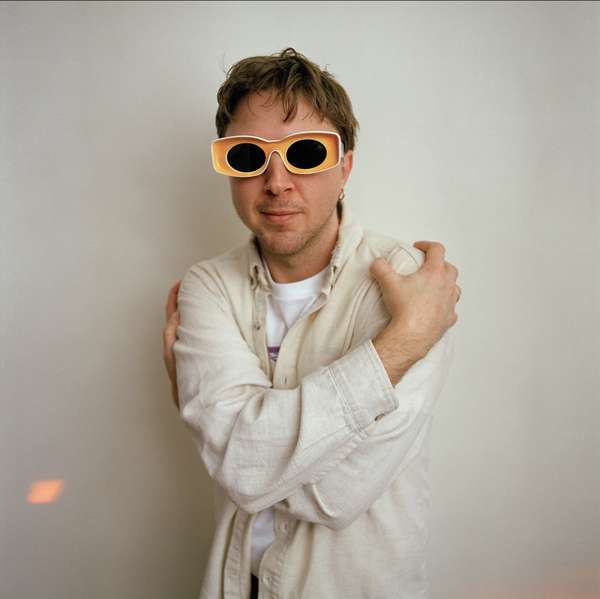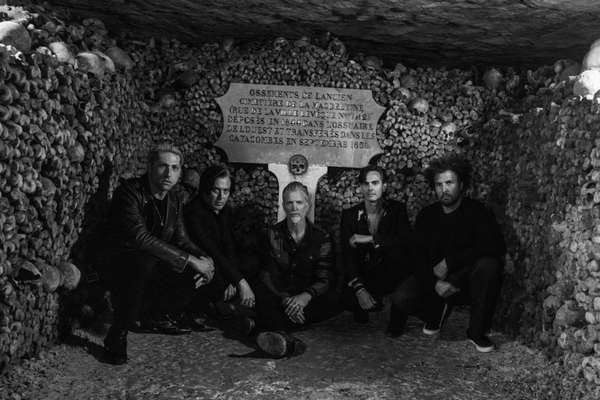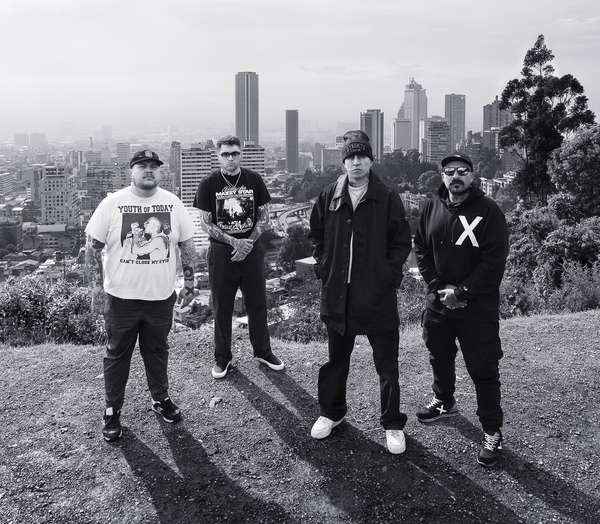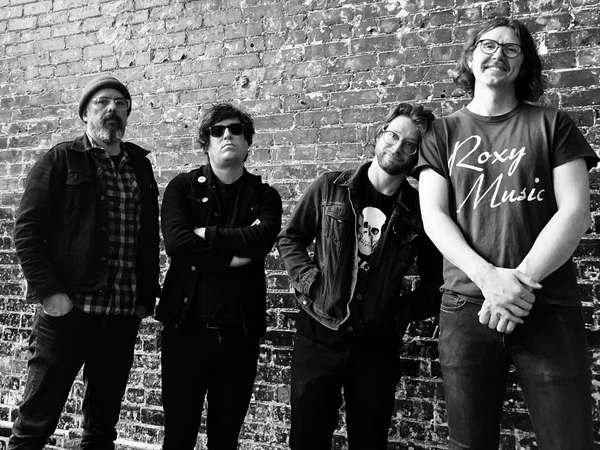The Secret Beach, about to release We were born here, what’s your excuse? on Friday August 23, has a new video from the record one day early. We’re excited to share a premiere of the song here, which captures the band’s warm indie-folk from the midcontinental province of Manitoba, Canada. The album releases via Victory Pool Records.
While Micah Erenberg is the primary songwriter and musician on the We were born here, what’s your excuse?, the record collects the talents of additional friends and collaborators for a rounded approach, pulled together via producer Rob Fraboni. While making the record, Erenberg cites Bob Dylan (with The Band) album Planet Waves as a huge influence. After some sleuthing, Erenberg recruited Fraboni, who also produced the Dylan record.
“Hat’s Way of Walking” is a cover song, reimaged from its original rendition by The Famous Sandhogs, who also collaborated on the song, video, and additional videos to debut from The Secret Beach.
SPB reached out for more info about the record and video:
The album title, We were born here, what's your excuse?, is a subtle nod to Manitoba. How has your experience of living in this province shaped the themes and stories in your music?
Manitoba is an interesting place because it is so isolated and yet so rich in experience. The city of Winnipeg boasts incredible cultural diversity, and the provincial climate ranges from at least -40 to +40 degrees Celsius, as well as from bone dry to sopping wet every single year without fail.
The whole province has just over 1 million people, making for a very tight-knit community. It feels almost like a big small town—1 degree of separation no matter where you go.
These extremes make Manitoba a deeply emotional place. My memories of growing up there are full of palpable sensations; not simply happenstance, but feelings, temperatures, smells, magical natural lighting, and more.
To write a song in Manitoba is not a difficult task. All one must do is step out into the world and allow natural experiences to permeate. Everything you need is right there, so all you must do is try as little as possible, and you’ll find the words sitting right there on the tip of your tongue.
As you can tell, Manitoba has had quite an impact on me. It’s not that my music is a reflection of Manitoba; it’s that I am a product of some very rich surroundings. Therefore, the less I try, the more Manitoba my music will be.
When I set out to make this album, I wanted to achieve absolute creative freedom with it. The only thing I tried to do when making it was to honour the deepest gut feelings of those who were creatively involved. I think this is the exact reason that the whole thing ended up having a Manitoban sparkle.
You recorded the album on vintage tape machines, giving it a timeless, analog feel. What drew you to this method of recording, and how do you think it complements the themes of the album?
In my process, there are four major components to analog recording that make it the premier method for recording music.
The first is the Steve Albini approach, which holds that analog media is more reliable and less distracting. Analog recording is an incredibly tactile, hands-on practice, with every problem having a clear solution. In the digital realm, a broad range of unnecessary options and problems can make the process distracting. It’s more difficult to make a digital record in less than a week, and it’s more difficult to make an analog record in over a week. Steve said there’s really no reason for a record to take more than a week to make.
The second aspect, which Albini might despise, is that I really enjoy how less-than-optimal analog gear affects audio. Ever since I was a kid, I have always enjoyed the character of cassette demos, with their tape warble, loud hiss, and the like. I became particularly aware of this when my sister and I found a homemade cassette from John K. Samson in a thrift store in Portage La Prairie (his hometown). It featured many Weakerthans songs in their early stages. It felt like I was with him in the room; it felt closer to the experiences he was singing about; it felt more real. This effect can also be achieved with digital recorders, but most of my experiences like this have been with analog tape, and therefore I personally associate that sound with those feelings.
The third aspect is the lack of editability. Over-editing kills everything—it damages the performance and vibe and disconnects you from your music. It makes you a worse player and creates a total disconnect between you and the people you are trying to create with. "We'll fix it later" is the mark of miscommunication, which is almost always a guaranteed death of anything collaborative.
The fourth aspect is that computers slow everything down—cell phones do, too. I understand that for some types of music they are absolutely necessary, but that is rarely the case for me. That said, recording analog is a privilege. It took many years to set myself up to do so, and even then, it’s unfeasible for some recording projects. If I must record digitally, I try to keep the computer screen as invisible as possible to the other artists.
This album was designed to honor the creative flow of those involved in making it. To me, doing it digitally would have presented infinite obstacles to that objective. Recording analog wasn’t the only way to achieve this, but it made the process a lot easier, and in some cases, it made it sound warbly as hell.
The Secret Beach's sophomore album features contributions from a diverse array of artists. How did you manage to balance these various influences while maintaining a cohesive sound throughout the record?
For me, making music is always about amplifying the love and trust between the people involved. I think everyone who played on this record felt that we were always working toward something we would enjoy creating and listening to. That’s not to say there weren’t incredibly tough, trying moments along the way.
I believe everyone involved trusted that I was pursuing something they could believe in, even if it wasn’t actually clear to either me or them at the time. Likewise, I had to observe other people’s creative processes, learn how to honour them, and then work with them and myself to achieve something magical.
The more you know the people you’re working with, the easier it is to navigate those processes. For example, the song “Where Did It Go?” was recorded by my lifelong best friend and I. We understand each other beyond any other friendship I have had. Recording that song was easy; we were able to be both complementary and critical of one another without getting bogged down by ego. Most of the album was like that with everyone involved, but that’s the best example of how to manage the coming together of creative minds: love each other, trust each other. And, ultimately, put one person in charge of each individual decision. My job as producer was to decide who got that distinction in each respective situation.

THE SECRET BEACH LIVE
August 31 - Winnipeg, MB - The Leaf
September 1 - Gimli, MB - Ship & Plough
September 5 - Vulcan, AB - Nine In A Line
September 7 - Nelson, BC - The Royal
September 8 - Enderby, BC - The Small Axe
September 10 - Spokane, WA - Spokane House Show Collective
September 12 - Vancouver, BC - Green Auto
September 13 - Bellingham, WA - Honey Moon Meads & Ciders
September 14 - Olympia, WA - Cryptatropa Bar
September 18 - Portland, OR - Turn! Turn! Turn!
September 19 - Astoria, OR - Obelisk
September 20 - Roseburg, OR - The Green Heron
September 21 - Mt. Shasta, CA - JCA
September 25 - Encinitas, CA - House Concert
September 26 - Long Beach, CA - Vine
September 27 - Parkfield, CA - Parkfield Café
October 8 - Peterborough, ON - Sadleir House
October 9 - Montreal, QC - Quai Des Brumes
October 10 - Wolfe Island, ON - Hotel Wolfe Island
October 11 - Hamilton, ON - Collective Arts Brewing
October 12 - Toronto, ON - The Baby G
We were born here, what's your excuse? track listing:
- Beautiful Everything
- Sunspill
- Buying You A Garnet Amp
- 22
- All This Living
- Have You Seen The News?
- If You Don't Love Me, Let Me Go
- Blame Manny
- Sucked Into It
- L.A. Haircut
- Long Distance Gossip
- Not So Bad
- Natural Metaphor
- Where Did It Go?
- Hat's Way of Walking



